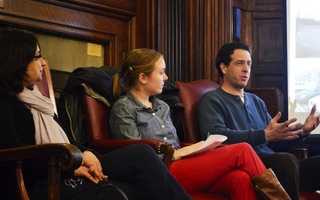Members of the Harvard-Allston Task Force continued to debate their priorities for community benefits at their meeting Monday evening as part of an ongoing discussion about Harvard’s Institutional Master Plan for Allston development.
Harvard plans to file its master plan with the Boston city government on July 25, according to Kevin Casey, Harvard’s associate vice president for public affairs and communications. Representatives from Harvard and the city have said that task force members will help inform the plan’s community benefits package, which is expected to set forth proposals for education programs and transportation improvements, among other services.
At Monday’s meeting, Harry E. Mattison, an Allston resident who sits on the task force, called for further discussion about what form the community benefits package should take.
Mattison proposed that rather than outlining specific projects that Harvard will finance, the community benefits package could take a “more general” form with the option of determining at a later date how residents would like to use money from Harvard to improve the neighborhood. Mattison said this solution might allow for some shorter-term projects while factoring in what he described as a “lack of information” about the costs and impact of other possible longer-term benefits—a concern that has been raised by task force members at past meetings.
Mattison proposed that the benefits package could “[dedicate] a certain fraction to short-term quality of life things like what we’ve been discussing, and then [take] the vast majority of it and [say] that more planning and study is needed.”
Gerald Autler, senior project manager with the Boston Redevelopment Authority, said that he does not think that the two approaches Mattison described are “mutually exclusive.”
“Inevitably, we’re going to all have to continue working to define the programming in conjunction with the people who know more about those subjects than we do,” Autler said. “I think it would be a mistake not to pick some really meaningful projects right now that can be carried out in the shorter term.... But that doesn’t exclude the idea that we’re not going to define every single detail of these benefits right now.”
The task force also heard a presentation from the BRA that featured the results of a survey about residents’ priorities for community benefits as part of a recap of a recent community meeting about public realm and open space improvements. Autler said there were “a few priorities,” including improvements to Smith Field and Soldiers Field Road crossings, that “really rose to the top” at the previous meeting.
Monday’s meeting also featured a presentation from Harvard about transportation improvements to be included in the master plan, as well as an analysis about the impact the projects, if approved and built, will have on traffic.
According to Casey, the traffic in the Barry’s Corner area is likely to be “worse” in 2022 if Harvard’s plan is not implemented than if its proposed development is carried out. The former scenario accounts for the construction of other, already-approved projects when predicting future traffic trends in the case that the master plan is not approved and implemented. Allston-Brighton residents have previously raised concerns about the impact Harvard’s construction will have on traffic in the neighborhood.
The task force’s next scheduled meeting is slated for Aug. 14 at the Harvard Innovation Lab. Tim McHale, a Brighton resident and member of the task force, said after the meeting that the task force is discussing the possibility of scheduling another meeting prior to that date. The meeting would be exclusively for members of the community and the task force, as residents asked for at the task force’s meeting on July 1.
—Staff writer Madeline R. Conway can be reached at mconway@college.harvard.edu. Follow her on Twitter @MadelineRConway.
Read more in News
With Time Short and Student Trust in Administrators Low, Pfister Seeks To Build CommunityRecommended Articles
-
Commitment to Old Allston Plans in FluxUniversity officials say they continue to consider the conditions of previous agreements they made with the City of Boston before the December halt of construction on the Allston Science Complex in brainstroming plans for Harvard’s development in the neighborhood.
-
Allston Residents Concerned About Harvard Capital Campaign PrioritiesWhile University officials focus on raising money for House renewal and development in Allston as goals for Harvard’s upcoming capital campaign, Allston residents are skeptical about how high of a priority the revitalization of their neighborhood will be.
-
Faust Updates on AllstonUniversity President Drew G. Faust wrote in a letter to Allston residents last week that Harvard continues to make progress on a three-phase plan outlined in her last letter, adding that Harvard continues to lease land in the neighborhood, extend short-term lease contracts, and make plots more attractive to buyers.
-
 Allston Residents Call for Detailed Plans
Allston Residents Call for Detailed Plans -
 SLAM Brings Allston Debate into Harvard Yard
SLAM Brings Allston Debate into Harvard Yard -
Harvard's Barry's Corner Projects ApprovedHarvard’s proposal for the Barry’s Corner Residential and Retail Commons in Allston was unanimously approved by the Boston Redevelopment Authority board Thursday evening. The project is slated to break ground in the fall of 2013.













